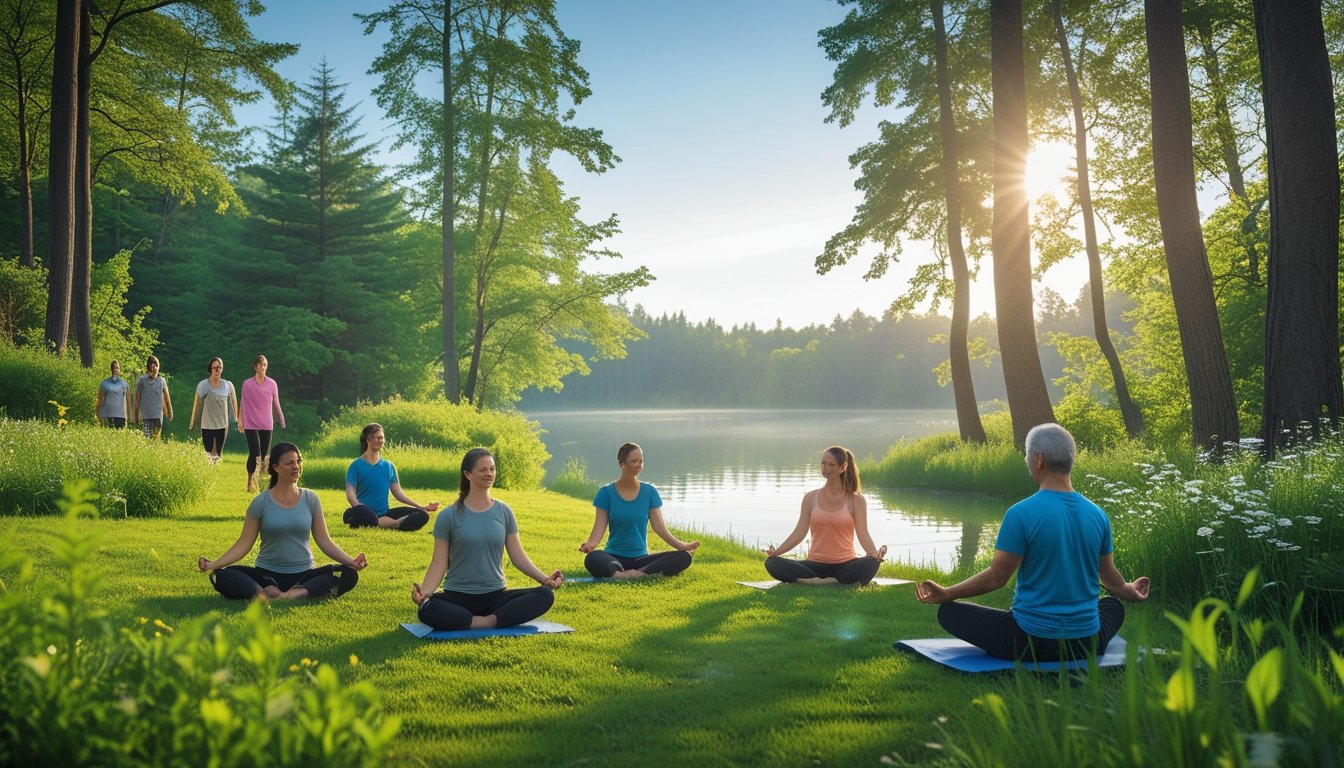Late updated: 31 May 2025 15:05
Written by: Ella Thompson
Tips For Enhancing Recovery With Nature Activities: A Guide to Natural Healing
Enhancing recovery through nature activities intertwines our innate connection with the natural world and our pursuit of mental and physical well-being. The environment around us offers a variety of experiences that can nurture our health and resilience. Spending time outdoors can significantly promote mental well-being, reduce anxiety, and improve emotional stability.

Engaging in nature activities can aid recovery by encouraging mindfulness, cultivating serenity, and boosting overall wellness. Whether it's regular nature walks, gardening therapy, or even outdoor yoga, integrating these practices into our daily lives can lead to profound improvements. By doing so, individuals in recovery not only foster personal growth but also establish a routine that fosters consistency and discipline.
Exploring the outdoors provides an opportunity to try new hobbies and establish healthier habits as part of the recovery journey. As scientists have noted, simply being in green spaces can result in substantial mood improvements and behavioural enhancements. Thus, nature activities are more than just leisurely pursuits—they are powerful tools for healing.
Key Takeaways
- Nature activities support mental health and emotional stability.
- Regular outdoor routines enhance personal growth during recovery.
- Green spaces can noticeably improve mood and behaviour.
How Nature Activities Enhance Recovery and Well-Being
Embracing nature activities can significantly benefit those on a recovery journey. These activities not only foster better physical health but also aid in reducing stress and boosting overall emotional and mental well-being.
Health Benefits of Engaging with Nature
Nature offers numerous benefits that support our physical and emotional recovery. Spending time outdoors provides fresh air and sunshine, increasing our intake of vitamin D. This essential vitamin helps with bone health and mood regulation.
Physical activity in natural settings, such as hiking or walking, promotes cardiovascular health, improving our stamina and energy levels. Forest bathing or ecotherapy can assist with relaxation and help us achieve holistic recovery goals. Outdoor environments can motivate and support rehabilitation efforts, as they engage the senses and invigorate our spirits.
Reducing Stress and Mental Fatigue
Outdoor activities are powerful tools for stress reduction and mental rejuvenation. Immersion in natural settings lowers cortisol levels, which reduces stress. Engaging with nature helps release endorphins, the body's natural mood enhancers, resulting in an improved mood and emotional well-being.
Forest bathing allows us to disconnect from technology and everyday stresses, offering clarity and mental peace. This practice can be especially beneficial for individuals dealing with depression or PTSD, providing a supportive environment that nurtures mental health. Through nature, we find a path to enhanced relaxation and reduced mental fatigue.
Supporting Physical and Emotional Healing
Nature activities contribute significantly to both physical and emotional healing. Whether it's cycling, hiking, or simply experiencing the outdoors, the benefits are evident in improved physical health and emotional stability. By regularly engaging in these activities, we boost our immune response and accelerate the recovery process.
Nature's soothing environment fosters emotional healing, offering solace during challenging times. Rehabilitation centres often incorporate nature as a vital part of holistic recovery programmes, emphasising its role in addressing underlying emotional issues. Through consistent engagement with natural settings, we can catalyse recovery, feeling rejuvenated and better equipped to tackle life's challenges.
Practical Tips for Using Nature Activities in Recovery

Connecting with nature can be a powerful tool in addiction recovery. Outdoor activities not only promote physical health but also aid in emotional healing. By participating in these activities, individuals can foster mindfulness, build social connections, and make urban spaces more conducive to nature-focused recovery practices.
Choosing the Right Outdoor Activities
Selecting suitable outdoor activities is crucial for their effectiveness in recovery. For some, hiking or rock climbing offers a chance to challenge themselves physically and mentally. Others may prefer the creativity found in gardening, nurturing life, and experiencing growth.
Some might benefit from quieter activities like bird watching or simply spending time in green spaces to enjoy the tranquillity. The key is ensuring the activity aligns with personal goals and fitness levels, increasing the chance of sustained engagement.
Incorporating Mindfulness and Sensory Experiences
Mindfulness can significantly enhance the healing power of nature activities. By practising meditation or exercises like yoga in natural surroundings, we encourage a deeper connection with the present moment.
Focusing on sensory experiences - the rustling leaves, the scent of fresh greenery, or the warmth of the sun - amplifies the mindfulness experience. It invites us to engage fully with our environment, contributing to relapse prevention by reducing stress and increasing happiness.
Building Social Connections and Community Support
Participating in outdoor activities can provide an excellent opportunity to build strong social connections. Whether engaging in community conservation projects or joining a local hiking group, these interactions foster a sense of belonging.
Such activities promote positive interactions and reduce isolation, encouraging a supportive environment. Comprehensive community support can be fundamental in guiding recovering addicts, offering support through shared experiences and encouraging persistence in their recovery journey.
Making Nature Accessible in Urban Life
For those in urban settings, integrating nature can seem challenging but is quite feasible. We can start with small steps like installing indoor plants or choosing local green spaces for exercise or meditation.
Urban planning often includes outdoor spaces where community events or gardening plots can be utilised. By prioritising time in these accessible natural settings, we support our recovery process while reaping the benefits of nature, showing that with some creativity, we can connect with nature anywhere.
Frequently Asked Questions

Exploring nature-based activities can significantly aid mental and physical recovery. The connection between spending time outdoors and improved health is significant, with benefits ranging from enhanced mental well-being to reduced stress and faster physical rehabilitation.
What benefits do outdoor activities offer for mental well-being?
Outdoor activities like hiking or gardening provide a sense of calm and mindfulness. These activities can improve mood and mental clarity, offering a natural boost to mental health. Engaging with the natural world often helps in overcoming negative thinking patterns and enriches one's sense of well-being.
Which nature activities can boost the recovery process after illness?
Walks in nature, meditative exercises like yoga in parks, and engaging in community gardening can be particularly effective. These activities promote gentle physical movement and encourage the absorption of fresh air and natural sunlight, which are crucial for recovery.
How can exposure to natural environments impact stress levels?
Natural environments have been shown to diminish stress significantly. The soothing elements of nature, such as greenery and flowing water, can reduce cortisol levels, leading to a more relaxed state of mind. Spending time in these settings aids in redirecting focus away from daily stressors.
In what ways does nature facilitate physical rehabilitation?
Nature provides diverse terrain that can enhance balance, coordination, and strength. Activities such as walking on trails or practising tai chi outdoors offer gentle yet effective ways to support physical rehabilitation. The sensory experiences inherent in nature can also stimulate healing and improve physical recovery rates.
Can time spent in green spaces contribute to emotional healing?
Yes, green spaces can be instrumental in emotional recovery. They provide a sense of peace and promote positive emotions. Being surrounded by nature encourages reflection, which can be beneficial for processing emotions and fostering emotional resilience.
What are effective methods for integrating nature into a daily wellness routine?
Incorporating nature can be simple. We can start by scheduling regular walks, having lunch outdoors, or practising mindfulness surrounded by greenery. For those with limited access to natural spaces, even placing plants indoors or listening to nature sounds may offer benefits.
